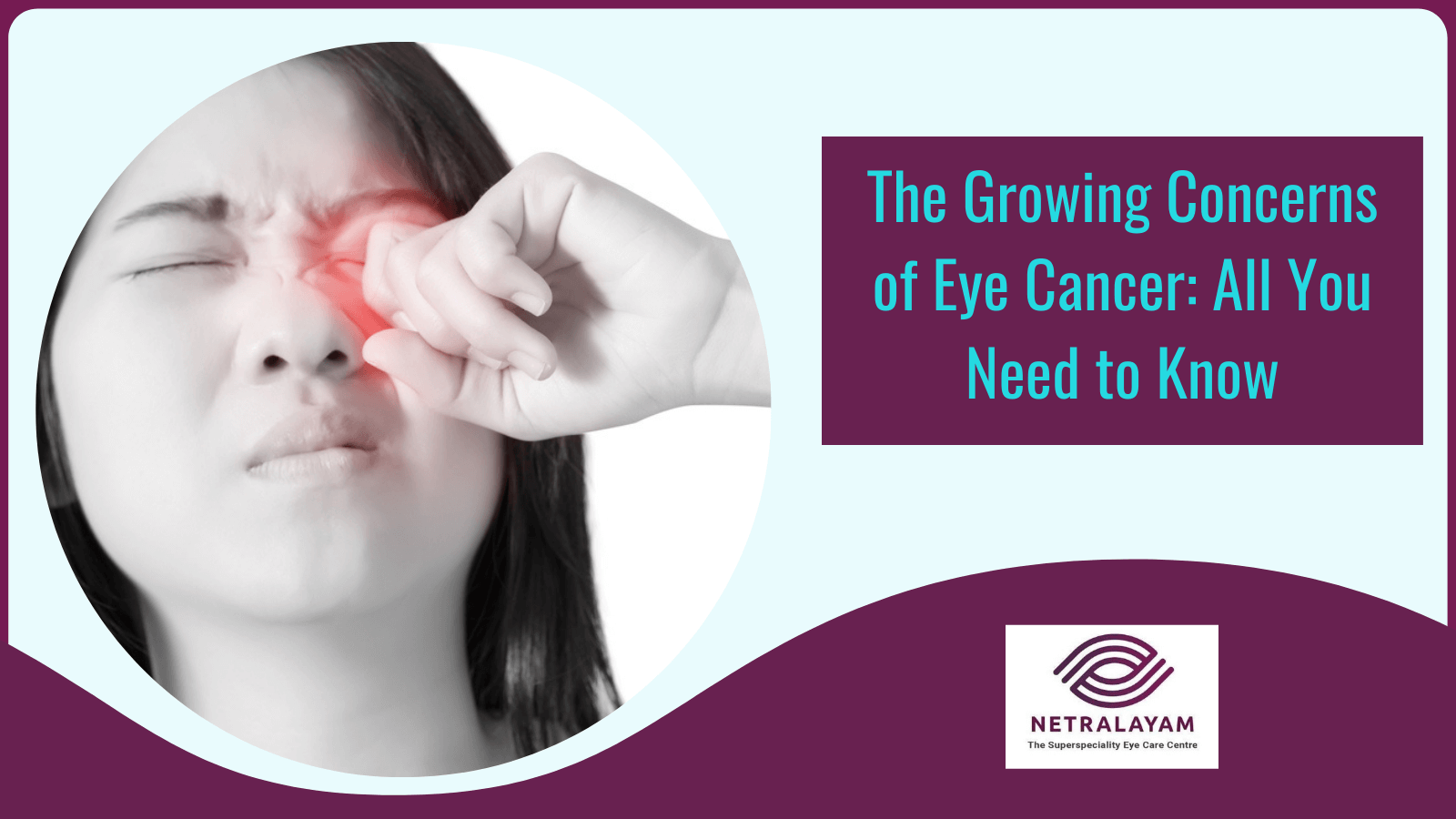Committed to Eye Care with Compassion, Technology and Competency
Committed to Eye Care with Compassion, Technology and Competency

12/13/2022
The eye, an organ people least worry about, can be a significant concern if not cared for properly. Among several conditions that can affect our vision, eye cancer or ocular cancer is one of the most dangerous. Eye cancer though rare, can pose risks to a person’s vision and sometimes be fatal.
Because of its rare occurrence, there’s a scarcity of information on eye cancer, and most of us often overlook its symptoms and risk factors. However, with over a thousand cases of eye cancer reported annually in India, the need for effective and efficient eye cancer care has become more prevalent.
Read on to learn more about this disease, its symptoms, causes, prevention, and treatment.
A cancerous cell that develops in one or more parts of the eye is referred to as eye cancer. It occurs when healthy cells in the eye grow uncontrollably and turn into a tumour. A benign tumour is usually harmless, but a cancerous one can spread to other parts of the body.
Cancer that develops in the eye is often referred to as intraocular cancer. In adults, the most common types of this disease are lymphoma and melanoma. On the other hand, in children, retinoblastoma is the most common type of eye cancer.
Most people with eye melanoma don't have any symptoms unless the cancer spreads to other parts of the eye. Retinoblastoma symptoms are also very rare in children. However, other minor eye conditions can also cause these symptoms.
If you have any of these, it is essential to get the doctor's attention to diagnose the right disease.
While a few of these symptoms might go away with time, we recommend consulting the best eye care hospital near you if they occur frequently.
Although the exact causes of eye cancer are unknown, certain genetic and environmental factors can increase the risk of developing Ocular cancer or Retinoblastoma. Several factors can increase a person's chances of contracting eye cancer. Some of these include the following:
Eye cancer treatment methods include chemotherapy, radiation therapy, and freezing or heat therapy. New technologies such as pharmacology, instrumentation, and tumour biology have the potential to create efficient and effective treatment methods for ocular cancer. In addition to a multidisciplinary team, other specialists such as radiotherapists, psychologists, and ocular oncologists help provide effective and efficient care. Brachytherapy is the most commonly used treatment for ocular cancer, including uveal melanoma.
An eye doctor at Netralayam can provide comprehensive examinations, especially for people with a family history of cancer. We also have a full-time ocular oncologist who works alongside other medical specialists to diagnose and treat eye cancer. Whether it’s an eye cancer diagnosis or treatment, we can help you with both. From medications to surgery and recovery, we will create a personalized treatment plan for you accordingly.
Eye cancer, if not diagnosed and treated in time, can be life-threatening. Don’t jeopardise your vision and life; get the best eye care treatment near you today. If you are looking for the best eye clinic in Kolkata, look no further than Netralyam Eye Care Centre. We are a well-equipped emergency facility with the best doctors and experienced staff. Fix an appointment with our expert ophthalmologists today.
In adults, the most common type of eye cancer includes:
Eye cancer is most likely to be cured if it is discovered early. Treatment can help prevent it from spreading. Follow-up visits are usually conducted by the healthcare team to check for the presence of cancer and to ensure that the treatment is working properly. They also help manage the side effects of the treatment. The treatment course can vary depending on the stage of the disease and the extent of the involvement. Although the odds of success depend on the type of cancer and its stage of development, treatment can be successful if performed according to the guidelines.
Eye cancer diagnosis depends on the stage and complexity of the condition. During the initial stages, your ophthalmologists may resort to various imaging techniques like ultrasound and Magnetic resonance imaging. A fine needle biopsy helps in the diagnosis of a small portion tumour. After the doctor has taken the sample, it will be sent to a pathologist, who will then analyse the results to confirm the diagnosis and to understand the nature of the tumour.
One of the most critical steps that people can take to reduce their risk of developing these conditions is to avoid exposure to ultraviolet radiation. Wearing UV-protective sunglasses can provide the best protection against damaging rays and help reduce the risk of developing skin cancer. Although the link between eye melanomas and sunlight is not yet known, some doctors believe that wearing sunglasses could reduce the risk of developing this condition.
Comments are closed
